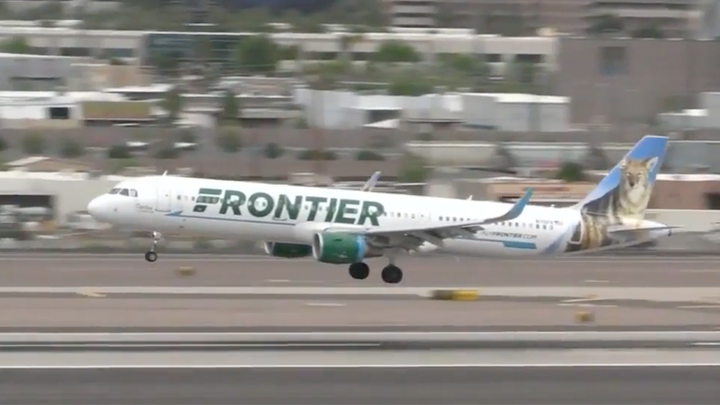A routine boarding process turned into a high-stakes security incident at Hartsfield-Jackson Atlanta International Airport on Saturday when a passenger discovered a fully loaded handgun magazine tucked beside seat 7A on a Frontier Airlines flight bound for Cincinnati. The chilling find—containing ten hollow-point rounds and engraved with the cryptic initials “K H”—triggered an immediate evacuation, a four-hour grounding, and an ongoing multi-agency investigation involving the FBI, Atlanta Police, TSA, and Homeland Security.
The drama unfolded just after 4:30 p.m. at Gate C-6 in Concourse C. Frontier Flight 1769, operating on an Airbus A320, had completed a turnaround from Cincinnati and was in final boarding when the passenger, seated near the front of the cabin, spotted the black magazine protruding from a seat pocket. “I thought it was a phone at first,” the passenger, who asked to remain anonymous, told reporters. “Then I saw the bullets. My heart stopped.”
Within minutes, the captain’s voice crackled over the intercom: “This is an emergency. Evacuate the aircraft immediately.” Passengers streamed onto the tarmac in a calm but urgent exodus, clutching carry-ons and children. “Everyone stayed surprisingly composed,” said Janyia Davis, a 28-year-old traveler from Ohio. “But you could feel the tension—like, who leaves that behind?”
Atlanta Police Department (APD) bomb and K-9 units swept the plane while TSA agents set up portable screening stations on the apron. Every passenger, bag, and crew member was re-screened. The aircraft was towed to a remote area for a secondary search using explosive trace detectors and X-ray machines. No firearm, no explosives, no secondary devices—just the lone magazine.
By 6:15 p.m., Frontier Airlines released a statement: “A subsequent investigation has confirmed the ammunition belonged to a law enforcement officer who was on an earlier flight on the same aircraft. The item has been secured, and the officer has been referred to local authorities for retrieval.” The airline emphasized that no threats were made and the flight was cleared for departure at 7:56 p.m.—nearly four hours behind schedule.
But questions swirl. How did a loaded magazine slip through cleaning crews, gate agents, and pre-flight inspections? Why was it engraved with “K H”? And why hasn’t the officer been publicly identified?
Sources close to the investigation, speaking on condition of anonymity, say the magazine is a standard Glock 9mm 15-round model, modified to hold 10 rounds—common for law enforcement off-duty carry. The “K H” etching, done in precise block letters, matches personalization trends among federal agents and air marshals, who are among the few authorized to carry weapons aboard commercial flights under the Federal Flight Deck Officer program and TSA’s Law Enforcement Officers Flying Armed protocol.
The FBI’s Atlanta field office confirmed it has taken the lead in tracing the magazine’s ownership. “We are working with the airline and law enforcement partners to identify the individual and determine how protocol was breached,” said Special Agent in Charge Maria Delgado. “While there is no indication of malicious intent, any unsecured weapon component in a sterile area is treated with the utmost seriousness.”
Under federal law, only qualified active-duty law enforcement—including federal air marshals—may fly armed, and only after completing TSA training, presenting credentials, and notifying the airline at least one hour before departure. Firearms must remain holstered or locked; ammunition must be in magazines, not loose. Leaving either behind is a violation that can result in decertification, fines, or criminal referral.
This isn’t the first such lapse. In 2019, a federal air marshal left a loaded pistol in a lavatory on a Delta flight from London to New York. In 2022, an off-duty FBI agent forgot a magazine under a seat in Charlotte. Each incident sparked internal reviews but no public disclosures of the officers’ identities.
Passenger advocacy groups are demanding transparency. “If this was a cop, fine—but tell us,” said Paul Hudson, president of FlyersRights.org. “The public deserves to know if the very people tasked with protecting us are creating risks.”
Frontier says the aircraft has since completed multiple flights without issue. The magazine remains in APD evidence lockup. The officer, per protocol, must retrieve it in person after an administrative interview.
As of Thursday morning, no arrests have been made, and the FBI says the incident is “contained.” But for the 160 passengers who spent Saturday afternoon on an Atlanta tarmac, the mystery of “K H” lingers—a stark reminder that even in the most secure corners of air travel, human error can load the chamber.
